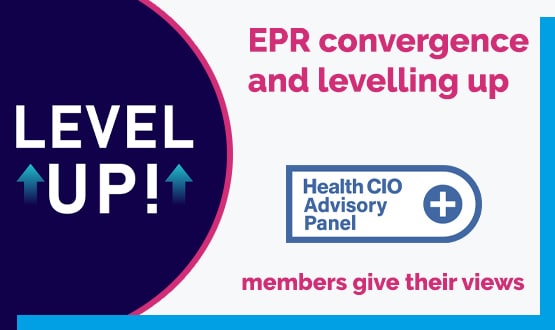Health CIO profile: Christine Walters
- 28 May 2014

Christine Walters was enticed away from a private sector job by the appealing opportunity to join what then was billed as the largest IT programme in the country.
That programme, of course, was the National Programme for IT; which was certainly big but which went on to fail in many of its key objectives. Despite this, Walters says she had fallen in love with NHS IT and there was no way she was leaving.
From food to healthcare
Many healthcare IT directors come into their roles from a management, finance or science background. For Walters however, IT was always on the cards. “I trained to be a computer programmer many moons ago,” she says. “I have always been very interested in computers and technology.”
This interest led Walters and four other directors to set up a software house specialising in food wholesale distribution systems. “Having my own business I had to learn how to do a lot of things, including pre-sales, design, project manement and handling the service desk. I had to do a lot of different roles,” she says.
The company grew from five people to 75 in a few years, but as the recession of the early 1990s hit, it needed a re-think. “The food wholesale systems customer market is very limited. “In the early 90s, with the recession, we were struggling. The company took on a new partner and I decided to do something else,” she says.
Walters then went to work for the Co-operative Group, or as most people know it, the co-op. It was a completely different world and a much bigger company, which came with “a lot of challenges.”
Walters worked in several roles, including business relationship management and analytics. Then, she heard about the NHS’ big IT project, which sounded as if it was likely to come with plenty of challenges and excitement.
She joined Salford Royal NHS Foundation Trust, where she spent five years as deputy director of IT, before joining Pennine Acute Hospitals NHS Trust as associate director of IT. “I always look to challenge myself and I got a broad spectre of experience.
“It’s a massive cliché, but it’s nice to come and make a difference. It’s about coming into somewhere that’s been bereft of good IT and doing something about it,” she says about moving into the health service.
Forward with the tech fund
Walters has now been at Pennine Acute Hospitals for four and a half years, and last year she was promoted to director of IM&T.
“It’s always been difficult trying to do a lot with not a great deal,” she reflects. “The NHS does not invest in IT the way it should. You have to do a lot with a very small budget.”
However, she is positive about the future, and feels that NHS England has finally got the centre’s approach right by introducing the technology funds.
So far, there has been one full round of bidding for £260m of tech fund money, and bidding for a second round of £240m has just got underway.
Both funds have been designed to support health secretary Jeremy Hunt’s call for a ‘paperless’ NHS by 2018, with a particular focus on e-prescribing, document management and, in the latest fund, integrated care records.
“The new approach with tech funds, it’s the right way to do it,” she argues. “It gives trusts the responsibility to do it themselves, but with some financial support.
“It’s nice being able to influence things and organisations are now dealing with IT and transformational changes themselves, instead of having [systems] imposed [which was the plan with NPfIT].”
Big projects
Walters acknowledges that a few years ago Pennine Acute Hospitals’ IT was “nothing to write home about”. The trust was due to receive the Lorenzo electronic patient record from the North, Midlands and East branch of the national programme, and waited for it for a long time.
Eventually, it decided to go its own way. The trust is now undergoing a massive reconfiguration programme, led by Walters, which has a particular focus on mobile and collaborative working.
The trust has implemented an electronic document management system and has outsourced its scanning. “It’s about removing the paper case notes, hosting that electronically, and electronic form capture,” she says.
Pennine Acute Hospitals is also working on the MedChart electronic prescribing and medicines reconciliation system from CSC.
Since the trust covers a vast population across North Manchester, Bury, Rochdale, and Oldham, and employs 8,000 people, this may be the largest MedChart implementation the company has done worldwide. “It’s one of the first major IT systems in here that affects all staff groups,” Walters says.
The trust has also implemented a virtual desktop, which is being rolled out with single sign-on. “From a clinician’s point of view, unless you have an electronic patient record, which we don’t have here, this is the biggest change,” she says. “It’s transforming the way clinicians work in a major step forward.”
Thinking regional
Walters is also heavily involved in region-wide projects, such as the Greater Manchester Consortium’s digital imaging procurement, which she led as the end of the national programme’s PACS and RIS contracts came into view.
The consortium consisted of 11 trusts in the region, all of which extended their PACS contract with GE Healthcare.
More recently, she has become involved with a procurement plan for a clinical portal for the Greater Manchester and Cheshire health economy, which includes councils, clinical commissioning groups, social care and NHS trusts. “We’re aiming to have a business case in the autumn,” says Walters.
No looking back
Even though Walters is playing such an important role in the trust’s move towards paperless, and in helping it to deliver on its policy and business imperatives, she does not have a place on the trust board.
This is something she is very diplomatic about. “It’s difficult, because boards tend to be quite small in the NHS. It’s not for me to say if an IT director should be on the board or not; but they should be part of senior decision making at the trust and have plans that are aligned.”
Walters also says that she continues to love every part of her role. “Coming into the NHS is the best thing I ever did. It tends to be change resistant, but the satisfaction I get when I’m able to bring in an improvement gives me my buzz,” she says.
| Fact box | |
| Name: | Christine Walters |
| Job title: | Director of IM&T |
| Time in current role: | Since autumn 2013. Been at the trust for 4.5 years |
| Key project: | EDM and e-prescribing |
| Favourite technology: | Virtual desktops. It’s a life changer |
| Best thing about job: |
When I can see the clinicians using the system, and liking it, that makes me happy |
| Worst thing about job: | Not having enough resources to do everything I want |




